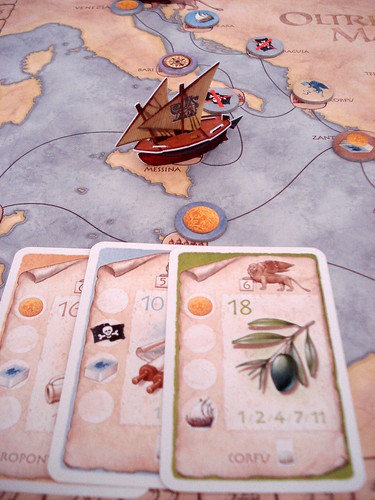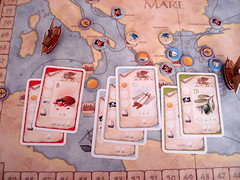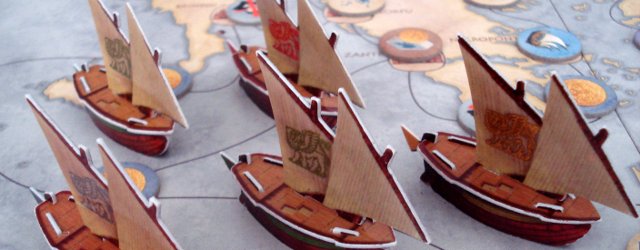| Strategy | Luck |
|---|---|
| Interaction | Components & Design |
| Complexity | Score |
In Oltre Mare, you take the role of a Venetian merchant, sending his ships to do business all across the Mediterranean Sea. I know, we’ve all been Venetian merchants before, but bear with me here. Oltre Mare is not the usual I-am-a-merchant game: there is no price fluctuations, you’re not picking up wooden cubes of different colours and although your ships are crossing the Mediterranean, they are not really transporting anything. In fact, Oltre Mare is much lighter than that, everything really important about the game is on one deck of cards. The board does have an important function beyond counting your money – which equals victory points- but the cards clearly have the centre stage.
What’s special about Oltre Mare‘s cards is the many different functions they perform: each card has four important pieces of information, and all of them are in effect. You don’t chose to play a card for it’s actions, or for it’s trade good, you play a card for everything it does and finding balance is key. The most obvious part of the cards is the goods it represents: from gems to wheat, everything is shipped across the sea. Each kind of goods is available in a different quantity and has a its own price progression in the scoring: for example, silk is worth one, three and seven ducati for one, two and three cards respectively. Olives, on the other hand, pay one, two, four, seven and eleven ducati for one to five cards. Next on the card is your hand size for the next turn and the number of cards you may play next turn. For extra annoyance, these two numbers always add up to seven, so when you may hold six cards you can only play one of them. Finally, each card has two of four action symbols. That’s a lot of things to consider for one card, but the game mechanics are simple enough not to bog you down with complex decisions.

You start your turn in the most unpleasant way: you discard cards down to your hand limit. That’s bad enough, but the cards also go to your pirate stack. No matter how awesome pirates usually are, in Oltre Mare we’re playing merchants and those two groups never did get along: every card in your pirate stack costs you a ducati in the scoring. Fortunately for you, the cards don’t have to stay there: after discarding you may buy cards from your pirate stack or from the draw pile for three ducati a piece, or you may trade with other players in any way you can get them to agree to – you may buy as many cards as you like now, the hand limit only applies at the beginning of the turn. It is possible to owe a debt in Oltre Mare but once you’re living on the bank’s money buying cards becomes more expensive. Interest’s a bitch. Also, money and victory points are the same thing, so being in debt means you might finish the game with a negative score and that would be just embarrassing.
Finally, you may play your cards – as many as the top card on your goods pile tells you to – and take the actions marked there. The idea of having a bigger effect with more symbols of the same kind continues here: for one, two or three ducati or card actions you receive one, three or six ducati or cards. For one, two or three pirates you take one , three or six cards from the draw pile and place them on your pirate pile. Ouch. Finally, the sailing action is where we may use the game board and the awesome plastic ships: for each sailing action you follow a trade route on the map from one port to the next and pick up the bonus marker at your final destination. These markers have various beneficial properties – giving you extra income, protecting you from pirates – but only the last one you collected is in effect, so the sailing action is a bit of a two edged-sword. After taking your action, you place the cards you just played on your goods pile. This is the pile that will be the biggest part of your income at the end of the game, but for now the bigger impact is that the top card – so the last one you place there – shows your hand limit and the number of cards you play for the next round.
Once in the middle of the end of the game and then again at the end, you score a few points for having traded the most, for having visited the most ports but most of all for your goods pile. For each series of similar cards in your goods pile, you count the cards and score based on the price progression: five olives in a row is worth eleven ducati, two gem bags in a row is worth five and so on. Just remember you can not split series of the same goods: Seven olives is still only worth eleven points, you can not split it into 5 olives and two olives and score 13 (11+2).

And that’s all, really. Oltre Mare is by no means a complex game, but it demands that you make meaningful decisions on each turn. Which cards to play is the obvious one, but there is the element of trading that is important for your success, the bonus markers to collect and the planning ahead for next turn. Having at least a moderately good memory is very helpful as well since you will want to know how many cards the current series in your goods pile has(you’re not allowed to check your cargo), the order of cards in your pirate pile to buy them back from there at the right time and maybe even the number of goods card of each kind that have already disappeared in the other players cargo hold to estimate your chances to score a longer series. I am in two minds about the components on Oltre Mare: on the one hand, I like the art, the folded plastic boats are beautiful, but the fact remains that ships and board are basically unnecessary: instead of collecting bonus markers from the board, some other mechanic could have given access to these. That would remove the aspect of finding profitable places in the Mediterranean that haven’t been plundered by the other players yet, but that is a very minor aspect of the game and in return it would fit a much smaller box. But in the category of family and gateway games, having a board and awesome plastic boats is a reason in itself, and that is the category where Oltre Mare is at home.







